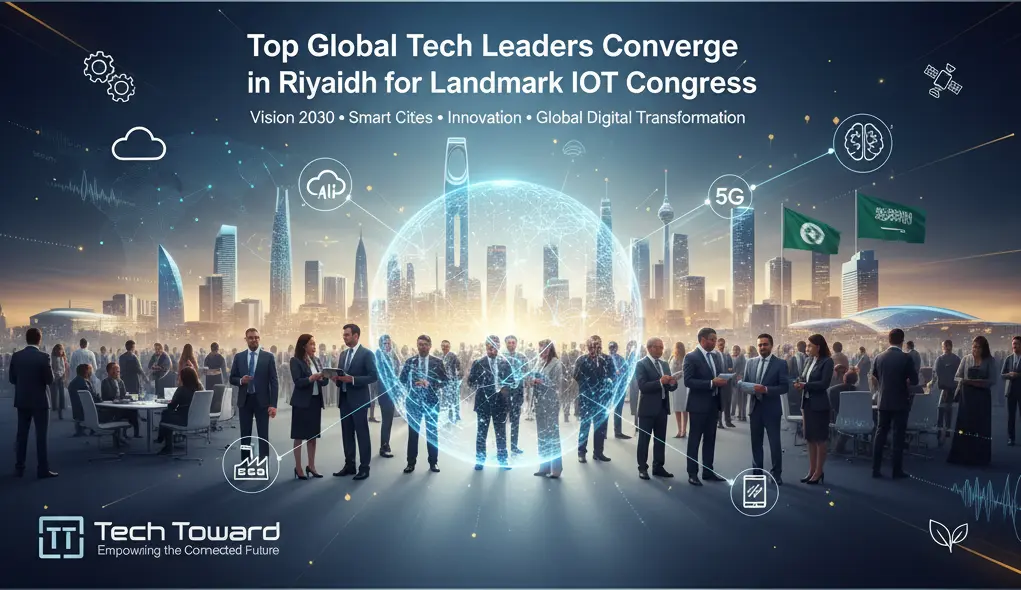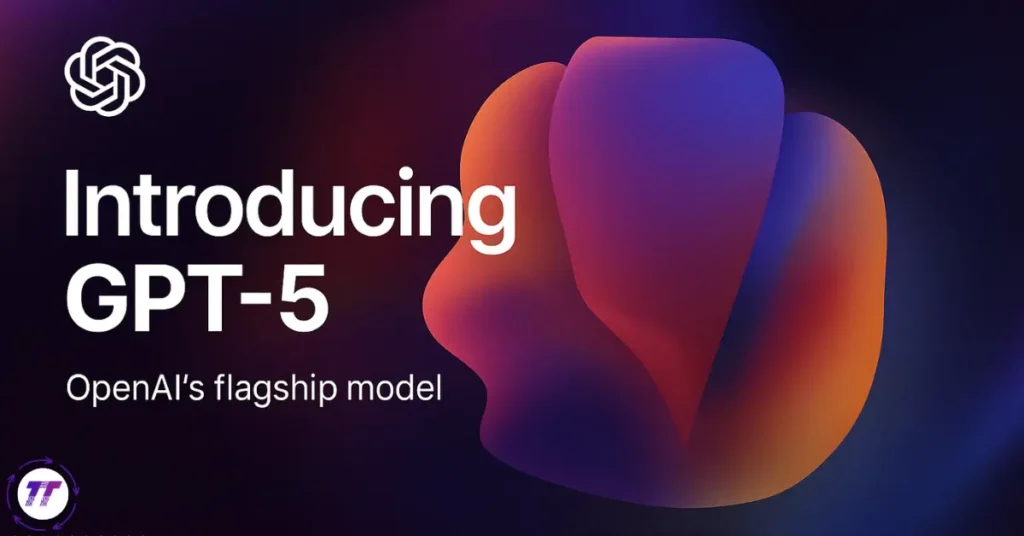Riyadh has become the epicenter of technological innovation as global tech leaders, startups, and policymakers gather for a landmark Internet of Things (IoT) Congress—a defining moment for the Middle East’s digital transformation under Saudi Arabia’s Vision 2030. Far from a routine conference, this event symbolizes the region’s ambition to shape the connected future of cities, businesses, and daily life.
Why Riyadh and Why Now?
Saudi Arabia’s Vision 2030 seeks to diversify its economy beyond oil and build a knowledge-driven, technology-powered society. The IoT Congress aligns perfectly with this mission, bringing together innovators to discuss real-world applications of IoT—smart cities, autonomous systems, sustainable energy, and healthcare innovation—rather than theoretical debates.
Understanding IoT: The Foundation of a Connected World
For Beginners
The Internet of Things links everyday objects—cars, appliances, sensors—to the internet so they can collect data, share insights, and make smart decisions automatically. Imagine your alarm clock signaling your coffee maker to brew as your thermostat adjusts the room temperature—IoT creates seamless, data-driven convenience.
For Tech Experts
IoT thrives on the convergence of:
- AI and Machine Learning for intelligent analytics
- 5G networks for ultra-fast connectivity
- Edge computing for instant processing
- Blockchain for secure transactions
- Cloud platforms for scalable data management
These technologies unite in Riyadh to showcase how IoT is transforming industries—from manufacturing and logistics to health and energy.
Why Global Tech Leaders Are Gathering in Saudi Arabia
Strategic Location
Situated between Asia, Africa, and Europe, Saudi Arabia is a natural hub for technology deployment across emerging markets, offering access to fast-growing digital economies.
Massive Investment
The kingdom is investing billions of dollars into digital infrastructure and R&D. Projects like NEOM, the $500 billion smart city powered entirely by renewable energy and IoT systems, illustrate the scale of its ambition.
Real Implementation
Saudi Arabia offers an opportunity to apply IoT at national scale, not just in pilot projects. Global corporations see Riyadh as a testing ground for innovations that can later expand worldwide.
Key Themes at the IoT Congress
1. Smart Cities
Discussions highlight how connected technologies can revolutionize urban life through:
- Traffic optimization, cutting congestion by up to 40%
- Smart waste systems that save millions annually
- Energy-efficient buildings adjusting conditions automatically
- Integrated public safety networks powered by AI
Cities like Barcelona and Singapore serve as models, and Riyadh aims to surpass their benchmarks.
2. IoT in Healthcare
IoT enables connected healthcare through wearables, remote monitoring, and AI-powered diagnostics. Hospitals can track patients in real time, while 5G enables remote surgeries and faster data sharing. For rural regions, these solutions promise life-saving accessibility.
3. Industrial IoT (IIoT)
Manufacturers leverage sensors and AI to enhance efficiency:
- Predictive maintenance halves equipment downtime
- Quality control via computer vision
- Smart supply chains with real-time tracking
- Worker safety through wearable monitoring
McKinsey & Company estimates IIoT could add $3.7 trillion to the global economy by 2025.
4. Sustainability
IoT supports environmental goals through:
- Air and water monitoring sensors
- Precision agriculture reducing water use 20–30%
- Renewable grids managed via smart systems
- Wildlife tracking for conservation
These efforts align with the Saudi Green Initiative, promoting ecological responsibility.
5. Cybersecurity
As billions of devices connect, security becomes crucial. Experts address encryption, blockchain-based protection, and AI-driven threat detection, drawing from NIST and other global standards.
The Power Players
Global Tech Giants
- Microsoft – Azure IoT solutions
- Amazon Web Services (AWS) – Scalable cloud platforms
- Cisco – Networking for connected ecosystems
- IBM – AI and quantum computing
- Google Cloud – Edge computing integration
Regional Champions
- STC – 5G infrastructure leader
- NEOM Tech & Digital Co. – Smart city innovation
- Careem – Mobility and logistics
- Noon – IoT in e-commerce
Startups and Policymakers
The event also hosts startups unveiling breakthrough innovations and policymakers shaping the global regulatory landscape for IoT deployment.
From Congress to Action: A Six-Step Impact Model
- Knowledge Exchange – Experts present real-world case studies and research.
- Networking – Businesses, investors, and governments form partnerships.
- Demonstrations – Live IoT prototypes showcase practical potential.
- Policy Development – Standardization and governance frameworks emerge.
- Investment Commitments – Funds and corporations announce financing rounds.
- Implementation – Pilot projects and partnerships evolve into large-scale initiatives.
The Economic Ripple Effect
Job Creation
IoT’s rise generates jobs for data scientists, developers, hardware engineers, and cybersecurity specialists. Globally, the sector is expected to employ millions in the coming decade.
GDP Growth
IDC projects global IoT spending will hit $1.1 trillion by 2026, contributing $13.2 billion to Saudi Arabia’s GDP by 2030. Countries adopting IoT early gain a decisive competitive edge through efficiency and innovation.
Global Success Models
Dubai
IoT initiatives have cut energy use in government buildings by 30%, saved 6 million work hours, and delivered $2.7 billion in economic gains.
Singapore
The Smart Nation program reduced travel times by 25%, improved emergency responses by 35%, and lowered waste collection costs by 20%. Riyadh aims to achieve similar large-scale outcomes.
Key Challenges and Emerging Solutions
Infrastructure
Challenge: IoT needs fast, reliable networks.
Solution: Massive 5G expansion across Saudi Arabia through public-private partnerships.
Data Privacy
Challenge: Data collection raises security concerns.
Solution: Adopting privacy-by-design and GDPR-style data protection regulations.
Interoperability
Challenge: Devices often fail to communicate across brands.
Solution: Developing global IoT standards via groups like the IoT Security Foundation.
Skills Gap
Challenge: Limited local IoT expertise.
Solution: Specialized university programs, bootcamps, and government training centers to build a skilled workforce.
Business Opportunities
For Large Enterprises
- Access emerging Middle Eastern markets
- Secure government smart city contracts
- Form strategic alliances
- Pilot innovations at scale
For SMEs
- Gain funding from regional investors
- Benefit from technology transfer programs
- Network with global corporations
- Receive support through Saudi incubators
For Startups
- Pitch competitions and accelerator access
- Exposure to investors and corporate partners
- Increased visibility in global tech networks
The Human Impact: IoT in Daily Life
Beyond economics, IoT is transforming how people live and work:
- Smart homes adjust lighting, temperature, and appliances automatically.
- Health wearables detect anomalies early, preventing serious illness.
- Connected infrastructure improves road safety and reduces pollution.
- Sustainable systems optimize resource use, protecting the environment.
By integrating intelligence into everyday objects, IoT makes life safer, greener, and more efficient.
The Road Ahead
Short-Term (6–12 months)
- Launch of pilot projects in major Saudi cities
- Establishment of innovation hubs and research centers
- Introduction of IoT regulations and standards
Medium-Term (1–3 years)
- Smart city rollouts in Riyadh, Jeddah, and NEOM
- Nationwide 5G coverage
- Growth of regional IoT leaders competing globally
Long-Term (5–10 years)
- Saudi Arabia as a global IoT hub
- Fully integrated smart urban ecosystems
- Creation of new industries and job categories
- Regional leadership in energy, healthcare, and mobility technologies
How to Get Involved
Tech Professionals
- Seek IoT roles in expanding Middle Eastern firms
- Join professional IoT forums and congress follow-ups
- Offer consulting expertise for implementation projects
Entrepreneurs
- Tap into Saudi innovation funds and incubators
- Network with delegates and investors via LinkedIn
- Explore partnerships for localized IoT solutions
Investors
- Track startups showcased at the congress
- Co-invest with sovereign wealth funds
- Follow regulatory developments that signal market opportunities
Students and Researchers
- Enroll in IoT and AI academic programs
- Apply for scholarships or joint research with Saudi universities
- Participate in student innovation challenges
Frequently Asked Questions
What’s the goal of the IoT Congress?
To accelerate digital transformation across the Middle East by uniting tech leaders, investors, and policymakers to implement scalable IoT solutions aligned with Vision 2030.
Who attends?
Industry professionals, government representatives, startups, investors, and academics from around the world.
How does IoT improve daily life?
Through smarter homes, efficient healthcare, optimized transport, and sustainable energy, enhancing comfort, safety, and productivity.
Why is Saudi Arabia an ideal IoT hub?
It combines government commitment, strategic geography, massive funding, and visionary smart city projects like NEOM.
What are the cybersecurity risks?
Device hacking, data breaches, and privacy violations. The congress emphasizes encryption, blockchain, and global standards to mitigate these.
Which sectors benefit most?
Healthcare, manufacturing, transport, energy, agriculture, and urban development—all undergoing IoT-driven transformation.
Is there an IoT talent shortage?
Yes, but Saudi Arabia is addressing it with education reforms, vocational training, and global partnerships.
When will results appear?
Within 6–12 months, expect pilot projects and policy rollouts; within 2–5 years, full-scale implementations and measurable impact.
Conclusion: Riyadh and the Rise of a Connected Future
The Riyadh IoT Congress marks a pivotal shift in how the world views technology, positioning Saudi Arabia and the broader Middle East at the forefront of global digital innovation. The event isn’t just about devices—it’s about shaping smarter societies where connectivity drives sustainability, productivity, and quality of life.
For businesses, it’s a gateway to new markets. For governments, it’s a blueprint for future-ready cities. For individuals, it’s a glimpse into a world where technology simplifies life and amplifies potential.
The Internet of Things is no longer a distant concept—it’s being built right now, in Riyadh. As nations and companies collaborate to create a more intelligent, efficient, and inclusive world, one question remains:
Will you be part of the transformation?
The future is connected—and it begins today.


